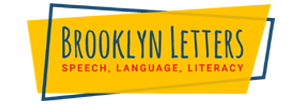
A tongue thrust, also known as orofacial myofunctional disorder, occurs when the tongue moves excessively forward or sideways during speech or swallowing. This can potentially affect dental and facial development. It often leads to an open lip posture, allowing the tongue to protrude from the mouth even at rest.
Given the diverse nature of individual tongue thrust cases, it’s imperative to assemble a proficient team comprising a dentist, orthodontist, pediatrician, and speech therapist. Addressing this condition requires a multidisciplinary approach to ensure comprehensive treatment and management, considering its impact on both speech and overall oral health.
At Brooklyn Letters, we understand the complexity of tongue thrust and emphasize the importance of collaboration among dental professionals, orthodontists, pediatricians, and specialized speech therapists to provide a holistic treatment plan.
Signs of Tongue Thrust Disorder:
- Protrusion of the Tongue: The tongue may protrude between or against the front teeth while speaking or swallowing, particularly during the production of sounds like /s/, /z/, /t/, /d/, /n/, /l/, and /sh/.
- Open-Mouth Posture: A tendency to keep the mouth open with lips parted and the tongue against the teeth even when at rest.
- Lip Conditions: Presence of cracked, chapped, and sore lips resulting from habitual licking to compensate for the discomfort.
- Mouth Breathing: Resorting to breathing through the mouth due to factors other than common ones like allergies or nasal congestion.
Our approach to tongue thrust speech therapy at Brooklyn Letters is educational and practical. We start by helping children and adults understand the significance of proper tongue and lip positioning, employing awareness training to highlight the difference between correct and incorrect postures. Our speech therapy exercises are tailored to each individual, focusing on adjusting the tongue and/or lip placement to foster healthier swallowing patterns and improve speech articulation. By practicing the correct swallowing technique, individuals learn to reposition their tongue, encouraging it to move backward rather than forward during swallowing.
For those experiencing speech sound errors as a result of tongue thrust, our experienced speech therapists offer targeted therapy. We aim to correct the placement of the tongue to facilitate the accurate production of sounds, ensuring a comprehensive approach to overcoming the challenges associated with tongue thrust.
By effectively addressing tongue thrust, Brooklyn Letters helps individuals achieve improved speech clarity and swallowing patterns and contributes to better dental health and facial development. Our commitment is to provide support, guidance, and effective therapy strategies tailored to each person’s needs, ensuring progress and success in overcoming tongue thrust.
